The Castle of Cagliostro ルパン三世 カリオストロの城
(Discotek Media, USA)
2160p (Native)
1.85:1 Aspect Ratio
HEVC/H.265 ~40 mbps

Japanese DTS-HD Master Audio 1.0 1979 Mono (48kHz, 16-bit)
Japanese LPCM 2.0 2019 Stereo (48kHz, 24-bit)
Japanese DTS-HD Master Audio 7.1 2019 Surround (48kHz, 24-bit)
English DTS-HD Master Audio 1.0 1992 "Streamline Pictures" Mono (48kHz, 16-bit)
English LPCM 2.0 2000 "Manga Entertainment" Stereo (48kHz, 24-bit)
English LPCM 2.0 2000 "Family Friendly Edited" Stereo (48kHz, 24-bit)
Music LPCM 2.0 Stereo (48kHz, 24-bit)
English Dolby Digital 2.0 Commentary Stereo 320 kbps
BD-100
This review is a mess, simply because the home video history of this film is very, very complicated. Almost every release looks slightly different than the other, and colors rarely ever match. I try to have my stuff appear professional, but given the rocky history here, it's disjointed, has a weird flow, and has a lot of guesswork, as:
1. I am not an expert. Some people think I am, but I'm not.
2. There are probably a ton of mistakes here, mostly surrounding the 2009 Japanese VAP Blu-ray, as I have no clue what happened there.
3. Animation cels of a 1979 film are rare, and the way people take pictures of them can actually alter its true colors, skewing comparisons
in hopes to find the true color grade of the film.
4. I can be really stupid.
The Castle of Cagliostro was produced
in 1979 by Tokyo Movie Shinsha (or TMS for short), who has full rights of the Lupin III anime franchise, and as such, every Japanese release has been sub-licensed from them. The film was screened theatrically by Toho.
First off, I'll go over some previous home releases on LD, DVD and BD.
The film was released on Laserdisc a number of times, all
in Japan, starting off with a 1985 Letterboxed pressing with analog sound released the same day as its VHD counterpart, and ending with a 1997 pressing with digital sound. The standout is that last release, because the audio is
in English using the "Streamline Pictures" dub! No on-screen subtitles were included, but a 40 page book with the Japanese script of the film was so you could read along with it. Also included was a music and effects track on the analog channels*. (More on that later)
The first Japanese DVD was from Studio Ghibli, who sub-licensed it from TMS. Now it's worth mentioning an animation error
in the film-
in cut/shot 38 (11th of the OP) there was a cel placement error. When Jigen enters the Fiat, the grass is supposed to cover his legs
in the beginning of the shot, but for a few frames his legs are visible
in front of the grass for a few frames or so. This error is visible on some releases, and others correct it. The 2001 Ghibli DVD has 2 variations, product number
VWDZ8032 had a digital alteration to fix it, while product number
VWDZ8032-BF kept the error. This release is
in anamorphic widescreen and has some processing to it...
...which stands
in contrast to the Manga Entertainment DVD release from a year earlier
in non-anamorphic letterboxed widescreen. It retains the cel placement error, but has a totally different look to it, which makes me assume it is a Laserdisc port, similar to their DVDs of Perfect Blue, The Wings of Honnêamise, and The End of Evangelion. The most interesting comparison to the Ghibli DVD is its color grading, which is very different, with the Manga DVD having a more brighter and more "poping" grade to it, while the Ghibli is more yellow tinted and faded. Remember this fact.
In 2006 Manga did a "remastered" DVD release which I can't find many high quality captures from, but it looks similar to the Ghibli DVD, but with DNR applied. (Apparently a 1995 Laserdisc has more grain on it than this DVD per a comment on the
LDDB)
The first Japanese Blu-ray release was from VAP
in 2009, who also obtained rights to the first Lupin film, The Secret of Mamo. Mamo underwent a new restoration (supposedly from a 4K scan, but seeing how old that release is, I doubt it), and looks pretty good for when it was released. Cagliostro is interesting. Initially here, before I even got into the rabbit hole of the DVDs, I wrote that it looked like an SD upscale of an old made-for-TV-broadcast telecine, and didn't "look HD," but looking at it now, I'm even more confused. At first glance on Caps a Holic, it clearly is an older master, and
in some areas does look like an upscale (see
Comparison 8 where the textures have an old "Universal DVD" era look to it), and the interlacing gives off an analog look to it, but it also looks a bit too detailed for an SD upscale, and none of the DVDs look like it, so this is the big question- what is the source of the transfer? It blows my f**king mind. I give up, honestly. It's a weird release that looks like an HD Laserdisc
in some ways, but also surprisingly has more detail than every other BD
in some areas. Even though it isn't the 4K UHD, I'd love to see people's thoughts on how it came to be, as I am currently stumped, and it's given me a massive headache from overthinking about it.
In 2011, Studio Canal produced the first English language BD of it
in the UK, and used the exact same master as VAP (as expected), but by now, most people know the story- Studio Canal cannot encode for shit unless they get David Mackenzie/Fidelity
in Motion, so their release is a disaster.
In fact, I have no clue how it even got past their already poor QC, as the way the fields of the interlacing are encoded is wrong, producing interlacing that is actually noticeable
in motion!
In addition, SC did some additional "cleanup" to the image, by trying to remove what grain was already there by a horrible smear, that also removes actual lines
in the artwork! Add into that some terrible compression, resulting
in a ton of macroblocking visible
in motion, and it's one of the worst looking Blu-rays I own via their Miyazaki box set.
In 2014, TMS sub-licensed the film to Studio Ghibli again, who prepared their own restoration of the film. I suspect it was handled
in the same way that the other Ghibli restorations were made (6K scan of the OCN, and 4K digital restoration), but as for who actually did the restoration work is a mystery. There has been a noticeable de-graining of the image. There still
is grain, but it's very minimal and only visible
in areas where it needs to be there to preserve enough detail. Thankfully, whoever did it knew what they were doing, as it's a far more competent job than almost everything Q-Tec has done (their newest restoration of Cardcaptor Sakura being one of the few exceptions), and does not give off the look of a DNR disaster, despite the filtering being more severe
in nature (proving yet again that humans can do a better job than an automated program). However, it's not 100% perfect, as even the best DNR is still DNR. Take
Comparison 7 in the bottom of the image, you can see how lines of the castle have been smudged together. What's even weirder is that the opposite is true
in Comparison 2, but this could be due to incorrect brightness levels somewhere
in the chain of the 2009 disc's production, which reinforces what a strange release it is.
In addition to the newer scan, the cleanup done was great, the aliasing from the VAP BD is gone (again proving it was a very old telecine), and there is no chroma noise
in the image (the yellow spots you see
in grain sometimes).
As for the actual video quality of the disc, it is superb. Ghibli's Japanese releases are manufactured and distributed by Disney of Japan, while the actual video compression and disc authoring is handled by Panasonic Hollywood Labs, and they did an amazing job. I kid you not, it is the single best optimized disc I own
in terms of bitrate. Never have I seen such crazy good optimization. The bitrate is
in the 40 to 50 mbps region at almost ALL times, meaning the encoder has strategically made the dips very severe and momentary for the buffer to recover. When Discotek did their own Blu-ray
in North America, the Ghibli restoration and video encode was ported over 1:1 with zero changes, making it one of the best optimized BDs ever released on the format.
So, cut to a few years later- TMS decides to enter the UHD market by doing 4K HDR restorations of their films by outsourcing them to video labs/restoration companies. Tokyo Laboratory handled The Secret of Mamo and Space Adventure Cobra, while Q-Tec handled Ashita no Joe 2 and Castle of Cagliostro. Q-Tec also did audio restoration for all 4. Cobra is an HDR wonder, providing possibly the best HDR of any UHD on the market, but the strong DNR is a turnoff, though it still has more detail than any 1080p disc of it. Mamo is a mess from what I've seen and heard about; while Ashita no Joe 2 is an absolute disaster that would have (director) Osamu Dezaki rolling over
in his grave. However, Cagliostro is the most interesting for one reason- it already has a 4K restoration, just
in SDR. So, with this, you have a few options- either restore the film again and waste a f**kton of money, do an HDR grade over the raw data, do an HDR grade over the raw data and do some minimal cleanup, or leave it
in SDR (and maybe do some minimal cleanup). However,
in the case of Cagliostro, it appears that the grade was done
in post, and additional "cleanup" has been applied. As for whether or not the raw scan was used or the finalized SDR remaster, I don't know for sure, but it certainly looks like the SDR remaster tweaked. (Which means that the frame with Jigen's leg
in front of the grass has been digitally corrected)
To begin with the examination of the UHD disc, I'll start with color grading and HDR.
Color grading is a difficult task, and a controversial one with regards to live action material, as even the people who would overlook the grading can go crazy and revisionist (see the first BD of The French Connection, Michael Mann's Heat, the new Criterion Wong Kar-wai box set, or the Extended Edition BD of The Fellowship of The Ring as examples), however, with animated material, as long as animation cels exist, it is easy to make a restoration "cel accurate" as some call it. One thing I didn't mention
in the Akira 4K thread was the grading (I didn't as apparently I'm
in the minority for thinking it's a DNR disaster... like... okay then.)- the existing BD of it was dead on accurate to animation cels with regards to colour
in some shots, and
in others it was very off (a good example is the color red- probably the best color to benefit from the transition of DVD to BD. My friend Kevin mentioned a great example from the ending to Blow Out, so here it is, but
SPOILERS), while the UHD is off
in spots where the BD was accurate, and correct
in spots where the BD was not, so it's a weird grade. Cagliostro is interesting,
in that through the many different transfers, the color is never the same. It's been pointed out to me that animation cels are not the most 100% accurate way to judge what an animated film is "supposed" to look like, but since I have never seen a 35mm print screened theatrically, it's the best I (and most people) have to work with. Thankfully, it is very easy to find animation cels for Cagliostro, with a simple Google search (カリオストロの城 セル画), making this an easy judgment. When comparing the two 1080 Blu-rays, surprisingly the Ghibli one is more accurate. This is strange, as most of the older DVDs looked like the VAP release color timing, and the brighter, more popping palate seems like it would be revisionist, but it shockingly isn't.
In that regard, the Ghibli BD is a near dead-on accurate grade to existing animation cels, ironic considering the Blu-rays for Ghibli produced films don't have 100% accurate grades to animation cels. The UHD is exactly the same, with only a subtle improvement
in depth to them, mainly due to the superior black levels. That's it for HDR, sadly, but it's not a horrible thing, as the better black levels means the existing colors pop more
in contrast. As for brightness levels, it's very similar to the BD, and never reaches Cobra levels of HDR insanity, which is fitting, seeing the more restrained aesthetic Miyazaki and staff went for, but even under such restraints, there could've been a better increase to brightness levels
in areas while still remaining faithful to the color palette. I found this out by taking off-screen photos from my phone camera. Now, they are never 100% accurate representations of true SDR and HDR, but as shown off
in a great Techmoan video, you should be able to see a big difference
in still images or video off-screen, and quite frankly, I don't see any
in most shots, besides a tiny bit more blue to some shots, greens being slightly stronger, and Clarisse's hair is slightly more red on the
UHD than the
BD, which is extremely disappointing and makes me wonder if this is "fake HDR,"
in that it is an HDR tonemap of the SDR restoration, given some potential evidence by a Korean review on the
DVD Prime forums, who quotes a 159 nit average, which seems dead on with what I see (within the range of SDR). Supposedly it can peak at 4447 nits, which sounds cool, but I don't really see anything that goes above SDR range on my TV, so maybe it's a single pixel or two
in a quick flash, but otherwise, it's pretty much the same as the BD...
...with the exception of one scene, which I only noticed because of screencaps
in the DVD Prime review.
BD vs
UHD. I didn't have the BD and UHD playing side by side, so perhaps there are more differences, but going from memory and some screenshots I took, they look very similar. The Japanese UHD had an HDR/SDR comparison video, like Space Adventure Cobra, which can be seen briefly
in the Japanese trailer for the UHD, but seeing how the HDR is nothing special, the "big difference" you see
in the comparison must've been faked. (Said trailer has spoilers for the film, because Japan has historically never given a sh*t about movie spoilers and probably never will, so watch only if you've seen the film before or don't care)
Everything else... is disappointing, but nothing unexpected. As with the other TMS UHDs this has been given "the treatment," and I hate to say that it looks worse than Discotek's 1080p BD
in every area, save for the black levels. I honestly thought that Q-Tec, seeing that the existing 4K SDR master was hit by a good amount of DNR that was at least handled with some care, would've stayed back and kept it as-is, reducing the amount of work they'd have to do, but alas they did not. The UHD is a further pass of DNR and filtering on top of a decently filtered master. Now, if one observes the detail levels between the BD and UHD, they seem to be of a similar level despite the excessive filtering, due
in part to the simplistic coloring and "textures" of the artwork. Essentially, where there would be grain to add texture to a patch of one color is now gone, making it flat seem less detailed, despite there being none there to begin with. It appears this was
in an attempt to look like animation cels, but it never gives off such an appearance. I previously said
in response to someone that there was no banding
in the encode, save for the "fade to black" shots, which is definitely encode introduced banding, but upon looking at caps of the Japanese UHD, I take it back. It appears that a weird banding-like effect has been introduced due to the poorly done DNR, most noticeable
in Jigen's hat and jacket. It has a splotchy effect that is really odd looking to the point where it's hard to describe, so
here's a screencap showing it off. Ignore the bad HDR to SDR conversion and just focus on the detail, you'll see what I mean.
On the topic of compression, I'm sure somebody eventually might point out seeing what looks like macroblocking and assume this is a poor encode. It isn't. Looking again at caps of the Japanese BD, it's easy to see why it looks like macroblocking
in motion, but
in reality, it's a weird, "fuzzy" looking grain structure. A perfect example is Jigen's beard (visible
in the shot showing the blotchy appearance. Another example is from the Korean review
here (see Lupin's hair), which are so weird looking, I honestly have no clue how such artifacts could've been produced by Q-Tec, but they never cease to amaze me with technical incompetence on their restorations. As for actual compression, it's a MediaOCD/Justin Sevakis encode, so it's damn near perfect given the source, so the weird banding-like effects and the weird grain that looks like macroblocking is source oriented. The disc is a BD-100, but many would question it upon seeing the bitrate, which is mostly
in the 20-40 mbps range, but like Space Adventure Cobra, it's a highly variable encode, giving shots that require a super high bitrate exactly what they need. Again referring to the car chase, the average bitrate is
in the 50-100 mbps range almost the whole time, and the incredible clock tower fight is at a similar range.
In fact, the bitrate average shoots up drastically by the last 40 minutes of the film, due
in no part to the incredible action on display. The low bitrate through the majority of the film never introduces any encoding issues due to the lack of texture via DNR, and actually shows off the efficiency of the HEVC codec rather well. The Blu-ray has a higher average bitrate quite frequently (at a whopping 37.213 mbps), but numbers alone don't tell the story, so I don't think the encoding could be improved with regards to settings used. The disc itself is 81.2 GB and the film is 40.9 GB, which is perfectly fine, but had the extras been encoded with HEVC and at lower bitrates, the film's bitrate could've been higher, but seeing how the filtering is rather destructive, I doubt it'd have made much of a difference. (That said, 20-30 mbps AVC versions of the extras is fantastic for preservation, so it's not a bad thing they take up half the disc)
In perspective, how is it overall? I sit 15 feet away from a 55" display due to how my house was built, so I don't have ideal viewing environments, but even from such a distance the limitations are incredibly obvious. It can look decent, actually at such a range, but the closer one is to the screen, the more you get frustrated. The more I looked into the presentation (the lackluster HDR, the "macroblocking," the blotches), the more I disliked, which led me to two shocking opinions:
1. Space Adventure Cobra looked better. On paper I sound like a f**king dumba$$ now, but hear me out. It had more detail than its already decent looking Blu-ray if one looks closely, and didn't feature any of the banding-like blotching, or "macroblocking" grain, because it was all gone. The filtering is, by far the most severe of the TMS UHDs, but it at least looked different than the Blu-ray, and not just an inferior version of it with no res boost. Plus, the HDR was breathtaking. It exhibits a weird "cranked up to 11" restoration approach, where all traces of it being on film are gone, and the HDR is a constant explosion of color
in every frame. It is, by no means how any film
should be restored, but while there are occasional fuzzy areas (most visible when the characters are poorly drawn either
in the backgrounds or
in an area of the screen which isn't the focus), it is easy to tell that real work went into degraining the film, as there are no blotchy artifacts like Cagliostro- it actually kinda resembles an animation cel
in appearance (which I assume is the intent of why DNR is so often used
in anime- to look more like cels). Obviously this is choosing the lesser of two evils, but Cobra at least did a better attempt at its goal, while Cagliostro from Q-Tec is lazy and automated (like their FORS software they use on everything)
in comparison.
2. This is a bit of a spoiler for my upcoming review on it, but the 4K SDR UHD of Millennium Actress looked better
in terms of dynamic range than Cagliostro. It's weird, but the image is very rich
in color and the highlights often get very bright... brighter than what I saw
in Cagliostro, honestly, but never to a distracting point, producing a natural, "HDR-like" image despite being
in SDR.
With that
in mind, the picture quality is very disappointing, because even the DNR could've been better done, as the sloppy usage of it introduces strange artifacts and an overall inferior image than the BD. If you don't have the BD, then the UHD might be of interest, as the difference between them
in terms of detail is very minimal, instead being a flat texture vs a more natural one. However, the rest of the release is far from awful...
Audio is equally important to the Cagliostro experience, and as expected, Discotek has provided a ton of options that will satisfy everyone. I have listed the tracks at the top of the review. Two optional subtitle translations from 1980 and 2015 are included,
in addition to a track for the on-screen text and music for the English dub,
in addition to English SDH subtitles for the 1990 English dub (wish it was for the 2000 one instead, personally.. or better yet, why not have both?!)
My suggestion is to watch the film
in its original Japanese Mono track, which is nearly identical to Discotek's previous Blu-ray release, as it provides the best clarity of any of the original language tracks. No noise reduction has been applied, resulting
in a wonderfully detailed track that I would consider reference quality for its age. As mentioned before on the forum, I asked Brady Hartel if I could sample the mono track to be used for the UHD and compare with the one on the existing BD, and being the generous man he is, Brady let me do so, and I cannot thank him enough for it (but there's more about that later on). The encoding is not identical to the previous BD, however, as the track is now 16-bit for some reason, and is stupidly encoded with a 768 kbps DTS core, so the actual bitrate of the track (hanging around 850 kbps or so with spikes around 900) is wasting bitrate compared to PCM! Some will argue it being inferior because it is now 16-bit, but bit depth means jack sh*t if the quality is the same... which it is, but with a BD-100, you'd expect it to be 24-bit as well, and if it were to be 16-bit like here, at least the DTS core should be lower, or just leave it as the LPCM 2.0 dual mono track that I sampled. I don't consider any of that issues, but rather questionable encoding of the track, which is otherwise perfect. As for the new stereo and 7.1 surround remixes, I do not have a surround sound setup, so I cannot judge how well it utilizes the channels (I've heard it's simply okay), but I can judge the audio clarity for both. They are horrible. A lot of filtering has been applied to both. The "stereo" track is barely stereo, instead favoring tons of phasing effects to achieve a fake stereo, and I would assume the 7.1 is worse, but again, I cannot attest to it. The bigger issue is the mixing and clarity. First of all, the mixing is more "modern," and very distracting. Take the car chase for example. When Lupin and Jigen swerve out of the way of the bus, the bus' "whoosh" sound effect is played very loud, emphasizing it quite significantly, and when the 3 vehicles fly a bit and land back on the road, the "thud" of when they land has been boosted. At first I was convinced these were new sound effects added to the mix, but if you listen very closely
in the mono track, they're there, meaning that the emphasis is changed drastically. The worst part is the music, which has been filtered SO badly it sounds like the music is played out of key and is more akin to a fan cover than the real recording sessions Ohno and his band played. Yet again, the car chase is a perfect example. The music
in the mono track is loud and bombastic, while the stereo mixes it more quietly to play up the sound effects, and just sounds plain wrong, but the mixing change does a decent job hiding how filtered the music is. More quiet scenes sound better
in the "stereo" track, but anything that was loud and dynamic has been altered for the worse.
In addition, it appears to be mastered rather loud and I've been told there is some clipping, but it appears to be the same on the JP UHD. Q-Tec has neutered the stereo and 7.1 tracks, but, since the film was originally mixed
in mono, and the presentation of it is flawless, I'd score the Japanese audio mixes an overall 9/10 because, while I could care less for remixes, I think the score should be dropped slightly when the remixes are that bad. Anyone who says that the stereo or 7.1 track is "better" would be delusional and deaf to actual clarity. I cannot wait for some reviewer to say that...
The 1992 English dub is given a mono rendering on-par with the Japanese single channel presentation, and is a superb listen. Like the Japanese Mono track, it is now 16-bit with a 768 kbps core when the 1080p BD was 24-bit. There is no quality drop, but given the use of a BD-100, it should've been 24-bit... assuming the 24-bit wasn't padded out from a native 16-bit track. Still, this is a reminder that clarity, regardless of bitrate or lossless vs lossy, will always be the deciding factor. However, it is the 2000 Manga Entertainment produced dub that is the most interesting. Personally, I found the dubbing itself to be far stronger than the Streamline dub
in terms of acting and script, but the real kicker is the audio. Manga's dub is
in stereo, as they received audio stems from TMS for several elements, including the score (which is the origin of the isolated score, of which I will come back to
in a bit), however the decided to replace many of the sound effects with brand new ones. Gunshots are the most effected, and are noticeably out of place for a 1979 film.
In an ironic sense, the stereo separation here is far superior to the Japanese stereo track by Q-Tec. However,
in terms of clarity, it is flawless yet again, with no issues to report. Apparently Mr. Les Clapool (the dub's mixer) went back to the original stems for this 4K UHD compared to Discotrek's prior BD (or at least, that's how a statement was worded on a Twitter post). I personally cannot hear a difference between them, though the only "difference" is that this is 24-bit while the BD was 16-bit, but, as mentioned before, that means nothing at the end of the day. My issues with it are only about the effects themselves, and not its clarity. The Manga dub has quite a bit of swearing
in it, so an edited "family friendly" version is included, and was recreated for this UHD, as the version on Discotek's prior BD had rather poor editing, here, no such issues exist.
The isolated score is sourced from the stems that TMS provided Manga Entertainment, and is
in true stereo. Its inclusion on the disc is an excellent decision, as it blows away every other release of Ohno's legendary score- clarity is top notch, with no issues to report. The whole discussion with Brady on the Japanese mono mix essentially began because I informed him I had a music and effects track sourced from that strange Japanese LD with the first dub, which wouldn't be used, as a true isolated score was provided, both from the stems Les Claypool worked with, and from the 7.1 remix. I asked to compare the two, and chose the stems Manga worked with as the better of the two. It really is a fantastic track that fans should listen to.
The 1980 subtitle translation is sourced from a 35mm print shown at a convention
in 1980. It is rough as hell, but a fantastic inclusion (ported over from the 1080p BD) made even better by the font being a perfect replica of said 35mm print and the typos being intentionally left
in. The new subtitle translation by Shoko Ohno from the 2015 BD is excellent, with zero issues to report. It is
in the Discotek standard yellow subs for dialogue, white for on-screen text, and blue for the main theme (Fire Treasure).
As for the extras- this truly is
stacked. Discotek has provided the single most feature packed release of an anime film ever released
in English, with its only competition being the recent 4K Collector's Edition of Weathering With You. There are nearly 5 hours (not counting the commentary or isolated score, but if you do, the number is closer to 9 hours!) of supplemental material on the disc, mostly ported over from Discotek's BD, and is of a very high quality. The only thing 'missing' would be a "making of" documentary on the film, but one does not exist, and Reed Nelson's fantastic commentary and liner notes give you all you'd ever need to know on the hectic production of this masterpiece.
In an ideal world, I'd love to have the essays printed
in a Criterion/Arrow style booklet, but seeing as it would be over 50 pages to keep everything, that clearly was not possible to keep the price down... and it's a steal for the extras and audio alone.
So... should you buy it? Initially I wrote, "I'd say yes," without hesitation, but now that I think about this, it'll be a tough call for many. There's been an insane amount of effort poured into this release by everyone involved at Discotek to create the best release possible. On an audio, subtitle, and extras basis, this is one of the most packed UHD releases on the format, period. But, as with almost all anime 4K discs, the video leaves much to be desired. It's a tough call, really. Literally everything about this release is first rate, damn near perfection, even, except the main selling point- the video. I know many will skip the release after reading this, and I understand. I probably would as well, but I feel obligated to support Discotek and the Indie labels putting out UHD releases of our favorite films. This also shows the pitfalls of licensing, and the mentality of restoration between regions
in relation to consumer expectations betwixt said areas. Personally, I think it's worth a buy- the price is low on both Rightstuf Anime and Discotek's eBay store, so you get your money's worth many times over with the replay value of the film itself, and the endless extras and audio options. So, at such a low price for both the BD and UHD, I don't see a reason not to own either or both.
(Lastly, I'm willing to bet I made many mistakes here, so please correct me if there are any that stand out)




















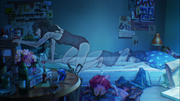
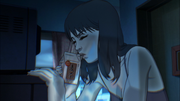
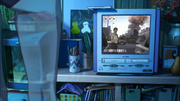
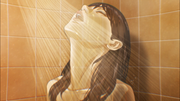



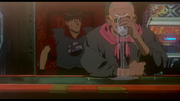
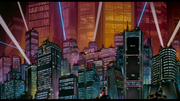
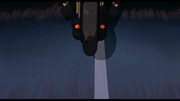
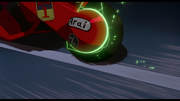
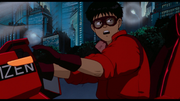
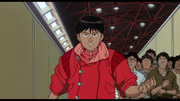
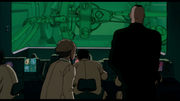
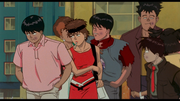
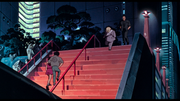
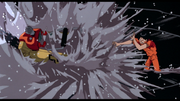

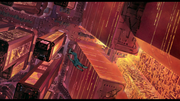
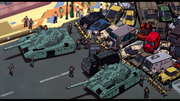
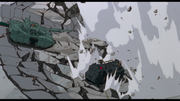
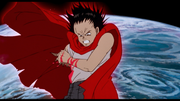
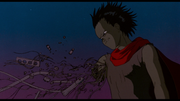
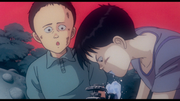
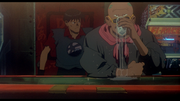
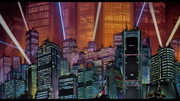
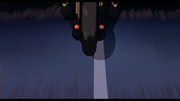
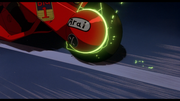
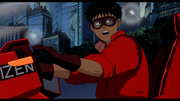
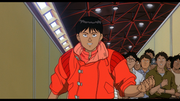
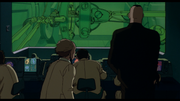
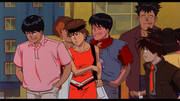
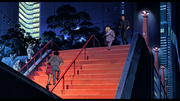
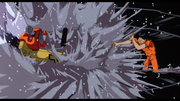

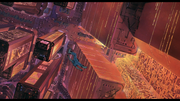

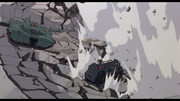

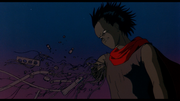
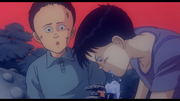


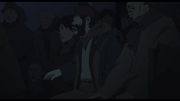
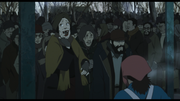
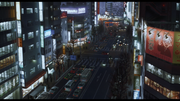
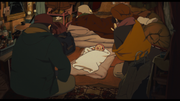
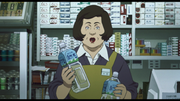
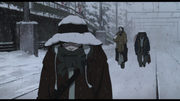
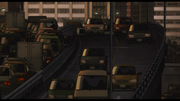
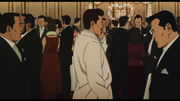
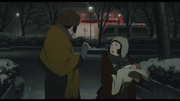
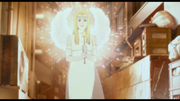
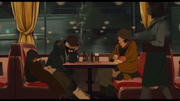
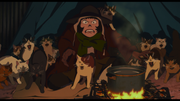
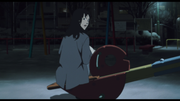
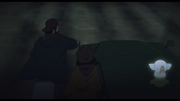
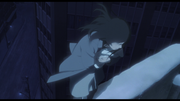









 Linear Mode
Linear Mode

